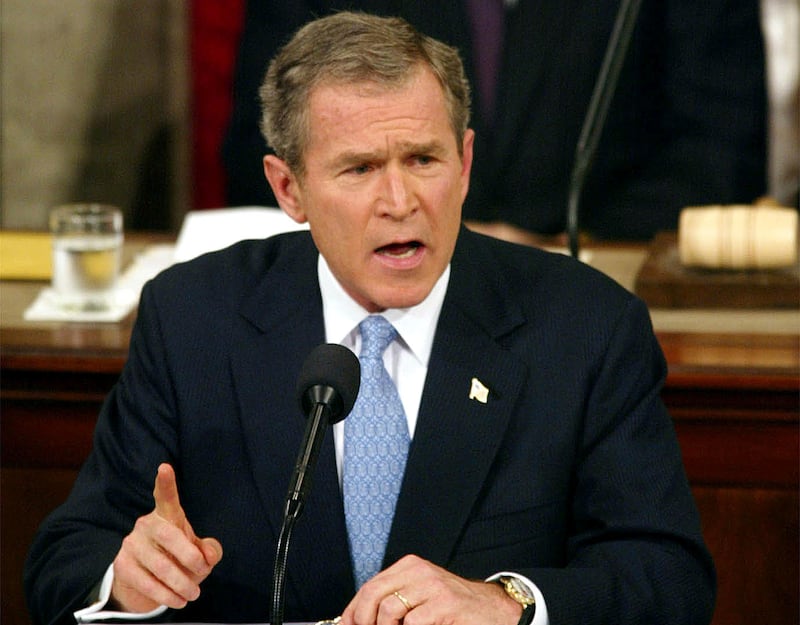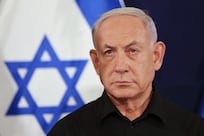For most of his first few months in office, George W Bush was widely seen as a barely attentive politician who got lucky with the Supreme Court and became president. His first state of the union address, in February 2001, was domestic, technical, focused on the high cost of energy and reforming social security. The world beyond America's shores was mentioned only once, briefly and in vague terms. "America," Bush said, "is a nation at peace but not a nation at rest." In the 15 years since, America has never again been at peace.
That perception of Mr Bush was interrupted by the attacks of September 11, 2001. He morphed into a war president – and his rhetoric morphed commensurately. When he gave his second state of the union address in 2002, America was different, and its president was different too.
That speech became famous for coining the phrase "axis of evil", lumping Iraq, Iran and North Korea together as "an axis of evil, arming to threaten the peace of the world". The impact of that speech was far-reaching; indeed its consequences are still detectable today.
Its legacy has been long too. Last week, when Donald Trump spoke to the United Nations for the first time, his rhetoric was similar to Mr Bush's. He singled out two of the same countries. He made specific threats against one country and unspecified threats against another. And in doing so he, like Mr Bush before him, made diplomacy much, much harder. Threats in 2002 did not stop either Iran nor North Korea's nuclear programmes; it accelerated them.
Tellingly, though, Mr Trump made no reference to Iraq, neither to the invasion sown, nor the aftermath reaped. That's because the rhetoric of both Mr Trump and Mr Bush always exists in the moment, taking no account of history nor of potential consequences. Had they done so, they would have realised that a moment of rhetoric on the podium can lead to years of hard, diplomatic work.
The axis of evil speech sought to frame a rather narrow political goal – invading Iraq because of the momentum of public opinion following the September 11, 2001 attacks – as something much larger and more noble. “History,” said Bush, “has called America and our allies to action, and it is both our responsibility and our privilege to fight freedom's fight.”
_______________
More from Faisal Al Yafai
The genie of Kurdish independence will be hard to put back in the bottle
[ The dream of Oslo has not died, it has just faded away ]
[ The Taj Mahal has been caught in a rising tide of narrow nationalism ]
_______________
The same notes of moral, Manichean rhetoric could be detected last week from Mr Trump. “If the righteous many do not confront the wicked few, then evil will triumph,” he told the General Assembly.
In the same way that Bush used "axis" to invoke the spectre of the Second World War Axis powers of Germany, Italy and Japan, so Mr Trump sought to set his current, narrow political goals in a world-historical context. "When decent people and nations become bystanders to history," he said, "the forces of destruction only gather power and strength."
Yet the history of the aftermath of Mr Bush's speech suggests that Mr Trump's rhetoric could backfire. In 2002, after Mr Bush made his speech, the diplomatic track on Iran and North Korea suffered an immediate and long-lasting hit.
On Iran, the speech took the Iranians by surprise. Joseph Biden, who was then head of the senate foreign relations committee and later became vice president under Barack Obama, said that within a couple of weeks, the Bush administration had softened its position in private, saying it sought dialogue with Tehran.
But the damage was done. Inside Tehran, the speech set off fierce debate about how to deal with the United States. Mohammed Khatami, then Iran's reformist president, had initially sought a conciliatory approach, but faced with the threat of military action, and then the reality of an invasion next door, the conservative faction of Iranian politics triumphed. Within two years, the reformist trend was overturned in parliament, and a year later Mahmoud Ahmadinejad became president.
The same thing happened with North Korea. Two weeks before the election that brought George W Bush to power, Bill Clinton's secretary of state Madeleine Albright was in Pyongyang to meet Kim Yong-il, the current North Korean leader's father. The regime agreed not to test further missiles and there was even talk of Mr Clinton himself visiting Pyongyang. By this stage, under a framework negotiated several years earlier, the regime had stopped producing plutonium.
_______________
The National at the United Nations General Assembly
[ Trump blasts Iran deal, threatens to destroy North Korea in UN address ]
[ Arab Quartet says Qatar must accept its demands ]
[ Egypt's Sisi meets Israel PM at UN for first public talks ]
_______________
Within weeks, relations had gone sour. Mr Bush – in comments that are eerily similar to Mr Trump's language on Iran – began to question whether Pyongyang was adhering to the agreement. Relations were strained until the speech the following year, at which point, concerned that the US would follow through on its threats, Pyongyang accelerated its nuclear programme, determined to build a nuclear weapon that could provide security for the regime.
Four years after the speech, with Iraq in flames, North Korea conducted its first nuclear test. Far from frightening North Korea or Iran into submission, Mr Bush's speech had instead set them off on a much more dangerous trajectory – one on which they are both still traveling. Ironically, despite warning in his speech that the three countries posed a “grave and growing danger”, all three became more dangerous after the speech. For every one of the three countries, the situation by the time of the next US election was worse. Will that be the same for Donald Trump?
As the new UN secretary general Antonio Guterres told the General Assembly directly before Donald Trump: "Fiery talk can lead to fatal misunderstandings. We must not sleepwalk our way into war." That message was not heeded 15 years ago, with tragic, horrific consequences for the entire Middle East. Is the same mistake about to repeated?





